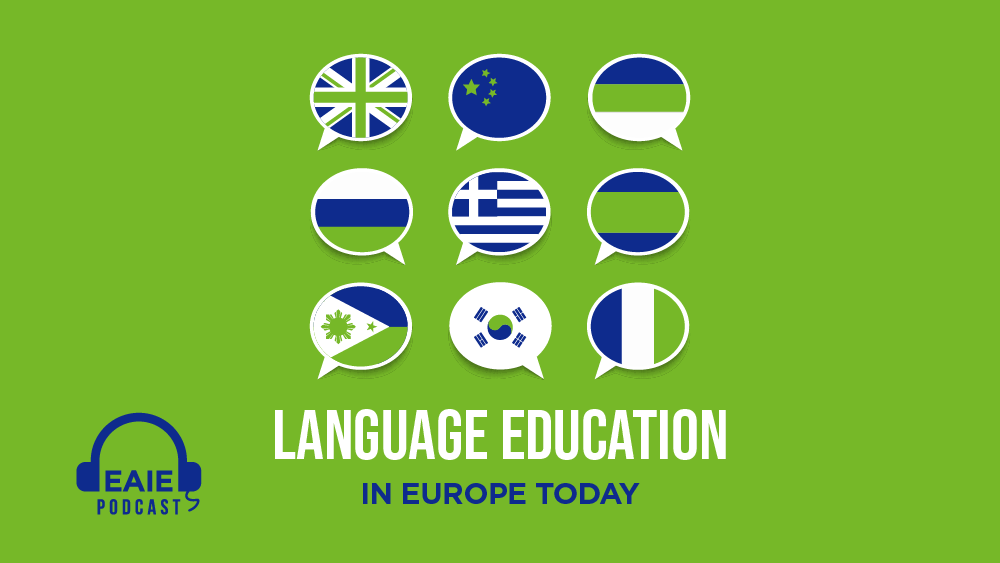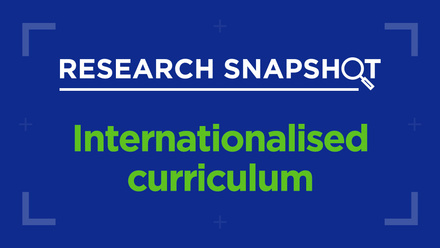Language education in Europe today

Hallo; Hej; Bonjour; Hello! When crossing borders across Europe and the world, we often find ourselves not only in a different country but also facing a different language. But what is the state of language learning in Europe today? With the widespread uptake of English across the globe, especially within IHE, is there still a need to immerse yourself in new languages? In this EAIE podcast episode, host Laura Rumbley talks to Susanna Slivensky, Deputy Director and Head of Programmes of the European Centre for Modern Languages of the Council of Europe (ECML), and Gerit Jaritz, a language teacher and teacher educator at Thurgau University of Teacher Education (PHTG) in Switzerland. In the interview, we learn more about the ECML, the general health and well-being of language learning in Europe today, minority languages, and the role of languages for democratic culture in Europe.
We also get to hear from two young people with a passion for languages. Evgenia Neftetzidou is originally from Greece but has been travelling across Europe, and her dream is to become a polyglot. Emma Phelan is a UK-born English-as-a-second-language teacher now living and working in France, with a keen interest in language learning. Both of them chat to us about why they decided to move into language education, and why learning a language is still vital in the modern day and age. Join us as we look at the state of language learning in Europe today.
About Susanna Slivensky, Gerit Jaritz, Evgenia Neftetzidou, Emma Phelan
Susanna Slivensky is the Deputy Director and Head of Programmes of the European Centre for Modern Languages of the Council of Europe (ECML). Before joining the ECML in 2005, she worked at universities in Germany, Austria and Japan as a lecturer, associate professor and executive director of a university language and international study centre. She has more than two decades of experience in language teaching. She has a doctoral degree in language education and a master’s in German as a foreign language, Japanese studies and organisational psychology.
Gerit Jaritz has worked as a language teacher and educator at Thurgau University of Teacher Education (PHTG) in Switzerland since 2005. She studied English and Romance Languages and Literature in Innsbruck, Strasbourg and Sydney. Before starting her professional career at PHTG, she worked as a language teacher at secondary school level in Switzerland and the UK. Gerit Jaritz is also the Head of PHTG’s international office and has extensive experience in the internationalisation of teacher education. She is part of the project team for the European project ‘Pluriwell: Fostering the plurilingual wellbeing of language teachers’, which runs from 2024 to 2026 and is supported by the European Centre of Modern Languages.
Evgenia Neftetzidou was born and raised in Thessaloniki, Greece. Growing up, she had the opportunity to travel extensively across Europe, which sparked her early passion for languages, cultural exchange, and adventure. One of her first big dreams? Becoming a polyglot! While completing her Business Administration degree, she began working as an Operations Manager at a vacation resort. Her passion for human connections and cross-cultural interactions led her to intern at the European Centre for Modern Languages (ECML) in 2024-2025. She is now on a mission to reach her polyglot dream, immersing herself in new languages and experiences while continuing to explore the world through her work.
Emma Phelan is an English as a second language teacher, working specifically in higher education in English for Specialised Purposes (LANSAD - Langues pour Spécialistes d’Autres Disciplines). With a linguistics and theatre background and a keen interest in language learning and cross-disciplinary communication, she draws on her academic and professional experience in the arts to bring a dynamic, communicative approach to the classroom that emphasises expression, creativity, and real-world interaction. Originally from Manchester, UK, she is currently based between the College of Human Sciences and the College of Health, University of Bordeaux, France.
Additional resources
For further insights into the topics touched on in this episode, the following resources may be of interest:
→ ECML website
→ Intercomprehension: a linguistic bridge to intercultural understanding
→ English as a medium of inspiration
→ Bessie Dendrinos: Multilingualism matters
→ Pluriwell project






